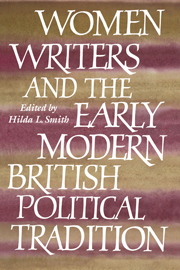Book contents
- Frontmatter
- Contents
- List of contributors
- Preface
- Introduction: Women, intellect, and politics: their intersection in seventeenth-century England
- Part I Women's political writings, 1400–1690
- Introduction to Part I
- 1 Christine de Pizan and the origins of peace theory
- 2 Political thought/political action: Margaret Cavendish's Hobbesian dilemma
- 3 Women's public political voice in England: 1640–1740
- 4 Contextualizing Aphra Behn: plays, politics, and party, 1679–1689
- Part II Women's political and philosophical writings, 1690–1800
- Part III The intellectual context and economic setting for early modern women
- Part IV Early modern legal and political prescriptions for women
- Conclusion: women's writing, women's standing: theory and politics in the early modern period
- Index
2 - Political thought/political action: Margaret Cavendish's Hobbesian dilemma
from Part I - Women's political writings, 1400–1690
Published online by Cambridge University Press: 04 August 2010
- Frontmatter
- Contents
- List of contributors
- Preface
- Introduction: Women, intellect, and politics: their intersection in seventeenth-century England
- Part I Women's political writings, 1400–1690
- Introduction to Part I
- 1 Christine de Pizan and the origins of peace theory
- 2 Political thought/political action: Margaret Cavendish's Hobbesian dilemma
- 3 Women's public political voice in England: 1640–1740
- 4 Contextualizing Aphra Behn: plays, politics, and party, 1679–1689
- Part II Women's political and philosophical writings, 1690–1800
- Part III The intellectual context and economic setting for early modern women
- Part IV Early modern legal and political prescriptions for women
- Conclusion: women's writing, women's standing: theory and politics in the early modern period
- Index
Summary
An affiliation between Margaret Cavendish (1623–1673) and Thomas Hobbes (1588–1679) might on first consideration seem unlikely. Cavendish was by her own admission both unlearned and undisciplined; despite having attended a French queen as a maid of honor and having lived in exile for sixteen years first in Paris and then in Antwerp, she never became fluent in any language other than English. Her reading, while substantially broader than has been acknowledged, was begun late and pursued haphazardly. Hobbes, on the other hand, though eager to demonstrate his independence from any religious or classical authority, was from his youth deeply steeped in the literate culture of Renaissance humanism, having translated Euripides' Medea before he left for Oxford. Cavendish's rambling volumes appear to record the spontaneous stream of her thoughts with little or no system or method. Hobbes's work, despite its puzzling inconsistencies, is clearly the product of a system builder. He was widely admired for his witty conversation; she seems, for all the garrulity of her prose, to have been struck dumb in the company of others.
And yet unlikely as this pair might at first seem, they share similarities, beginning with their traditional reputations as isolated thinkers “without ancestry or posterity.” They traveled in the same circles. Both were considered mad by some and feared by others, in part because they insisted that the nature of God was unknowable and also because they shared a disturbingly pessimistic view of human nature.
- Type
- Chapter
- Information
- Publisher: Cambridge University PressPrint publication year: 1998
- 1
- Cited by

